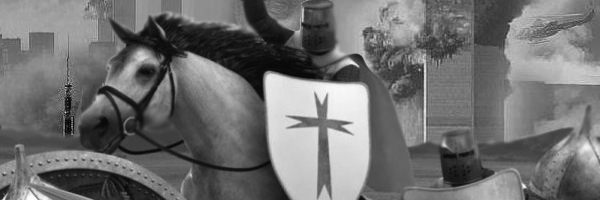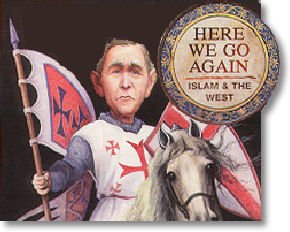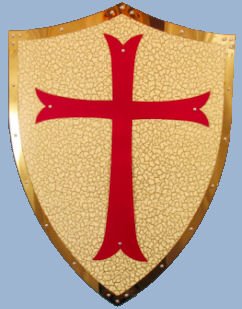
In their attempt to seize the Holy city, the Crusaders may have unwittingly precipitated the growth of extremism in Islam
In a quick and brief review of one of the most unsuccessful wars in which the west was ever engaged, we cannot help noticing their great mistakes. We see rashness, overrated self-confidence, depreciation of enemies, lack of foresight, ignorance of the difficulties to be surmounted. The soldiers were diverted from their main object, and wasted their forces in attacking unimportant cities and killing innocent people mistaken for alleged enemies.
This might strike a lot of people as descriptive of the allied western forces under the American leadership in their war on terrorism, but ironically enough, I was shedding little light on an older matter, I was referring to the medieval crusades.
The thought to be holy war that lasted for two hundred years, during which thousands of feudal armies were sent to capture the holy city of Jerusalem. Just like the masses of western allied forces that were shipped over to the middle and far east- Iraq and Afghanistan- in a crusade- like mission of pursuing fundamentalist group of Islamists portrayed –by the Mainstream Media- as the evil doers of defying and terrorizing the west by attacking new York, the heart and capital city of the modern west.
When President Bush first declared the war on terrorism soon after the Sept. 11 attacks, he made the mistake of using the word “crusade” to describe it. That was much condemned in the Arab world, where the Crusades are often cited as emblematic of Western designs on the Middle East.

In the late 11th century, Urban II, the Pope of Rome declares an unprecedented and unprovoked crusade to seize Jerusalem from the Arabs, who have been living there in a peaceful coexistence with the Jews. In just a few years, European knights seize the city, indiscriminately slaughtering most of its indigenous- Muslim and Jewish- inhabitants and launching two centuries of holy war.
Medieval society was assorted, but not so different as to be completely alien to what we experience in the 21st century. In the eleventh century, medieval people were born, raised up, fell in love, married, had kids, and died. People got ill, went to church, taken drunk, committed adultery, looked after their older parents, grieved for their dead and discharged to war. Christian wars, seven futile consecutive crusades that lasted for two hundred years, started in the late eleventh century and lasted till the late thirteen century.
But why, why people with lives, homes, and families in Europe would risk losing it all to mount an invasion of a land thousands of miles away which they never visited before and knew little about, Jonathan Riley-Smith, the crusades historian asks.
Only Religious faith and devotion can do the emotional heavy lifting necessary to make such actions explicable, not economics or imperialistic dreams. There is a strong emphasis that the medieval Knights were engaged not in a secular war, intent on the acquisition of new territory and riches, but that the Crusades had a higher purpose and were fought in the name of God; the Knights were engaged in a Holy War.
Christian Fundamentalism
But again, what kind of faith that approves of violence for the establishment of a Christian state .such was the moral imperative behind the crusades — something which they thought God desired and which Christians owed God because of their sin.
How and why did this theology develop, and what, if anything, does it mean for us today? Does it ring a bell? Does it in any way remind us of the same theology adopted nowadays by the Islamic extremists whom we look down upon as savage and uncivilized?

“Kill the infidels and capture the holy city” That was the Hate rhetoric of the crusades, and it was escalating into violence and unprovoked aggression. But the crusaders while doing the butchery in the name of Christ, they seized not the holy city but captured the bitter truth of what the whole crusade was all about. They discovered that they were not engaged in a war with a bunch of infidels, rather they were fighting gallant and religious warriors who were defending their homeland and the city of Jerusalem, a city they also viewed as holy and worthy of their sacrifice of blood
Strangely enough, the medieval Crusades were taken and then turned into something they never really were in the first place,” says Thomas Madden, a historian of the Crusades at St. Louis University. “They were turned into a kind of proto-imperialism in an attempt to harvest the fruits of the Islamic civilization. For during the Middle Ages, the great power — the great sophisticated and wealthy power — was the Muslim world. Europe was the Third World.”
Prior to the Crusades, the Muslim world had been tolerant of religious diversity. Afterward it became more conservative and less tolerant of people of other faiths, says the author, Annalou Mack.The Muslim response to the onslaught of Christian invaders was to unite to fight the crusaders. They had not experienced this common sense of purpose since the early years of their newly formed Empire.
In their attempt to seize the Holy city, the Crusaders may have unwittingly precipitated the growth of extremism in Islam. A notion that hasn’t crossed the minds of today’s policy makers nor the Generals who orchestrated the crusade-like war on Islamic terrorism.
The crusades proved to be a complete and total flop of failure, the conduct of those wars excites our contempt, and we despise the incapacity of their leaders as much as we abhor the fanaticism which animated their troops. History will always identify the crusaders as the misguided warriors who managed to worsen relations between Muslims and Christians. Mutual Respect almost disappeared leaving nothing behind except distrust and suspicion. And in return, when hostility took political expression among Muslims, it gave birth to a new kind of political radicalism with a militant edge.
There was no inevitability, historians argue, about the wars fought for possession of the Holy Land between western European Christians and near-eastern Muslims. That should drives us to question the necessity of the war on terrorism and wonder how history will eventually remember the soldiers and veterans of this global war who – like the crusaders- were hurled into another unjustified war with Muslims.
When any western power interferes with Muslim affairs it is seen by the Muslim world as another Christian Crusade. This is the legacy of the Crusades and will continue to dominate the relations between Islam and Christianity for years to come.

Ashraf Ezzat is an Egyptian born in Cairo and based in Alexandria. He graduated from the faculty of Medicine at Alexandria University.
Keen not to be entirely consumed by the medical profession, Dr. Ezzat invests a lot of his time in research and writing. History of the ancient Near East and of Ancient Egypt has long been an area of special interest to him.
In his writings, he approaches ancient history not as some tales from the remote times but as a causative factor in our existing life; and to him, it’s as relevant and vibrant as the current moment.
In his research and writings, Dr. Ezzat is always on a quest trying to find out why the ancient wisdom had been obstructed and ancient spirituality diminished whereas the Judeo-Christian teachings and faith took hold and prospered.
Dr. Ezzat has written extensively in Arabic tackling many issues and topics in the field of Egyptology and comparative religion. He is the author of Egypt knew no Pharaohs nor Israelites.
He writes regularly at many well-known online websites such as Dissident Voice and What Really Happened.
Dr. Ezzat is also an independent filmmaker. His debut film was back in 2011 The Annals of Egypt Revolution and in 2012 he made Tale of Osiris a short animation for children.
In 2013 his short The Pyramids: story of creation was screened at many international film festivals in Europe. And he is working now on his first documentary “Egypt knew no Pharaohs nor Israelites”.
ATTENTION READERS
We See The World From All Sides and Want YOU To Be Fully InformedIn fact, intentional disinformation is a disgraceful scourge in media today. So to assuage any possible errant incorrect information posted herein, we strongly encourage you to seek corroboration from other non-VT sources before forming an educated opinion.
About VT - Policies & Disclosures - Comment Policy



